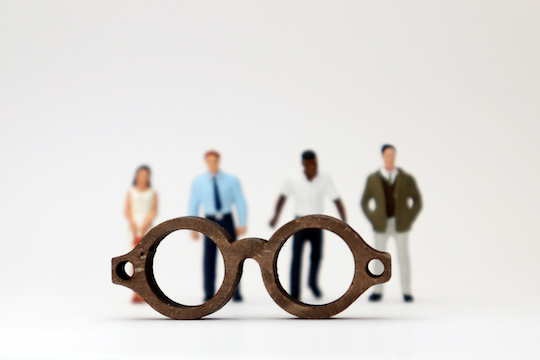The Insidious Nature of Unconscious Bias
- By
- Steve Williamson, VP Digital Content at eRep
- Posted
- Monday, August 3, 2020

Racism vs. Bias
There is a difference between racism and bias, but both can be conscious or unconscious. While racism is a belief that each race has different attributes, along with a belief that one or more races are inferior to others, bias is often more subtle. It implies an inclination or predisposition toward a certain viewpoint. Bias can be about race but it can also be about many other things.[1]
One of the most common forms of unconscious bias is Blind-spot bias.
"Failing to recognize your own cognitive biases is a bias in itself. People notice cognitive biases in others much more readily than they do in themselves."
In many ways, most of the common forms of bias are unconscious. We don't seek out bias or revel in the fact that we arbitrarily prefer one thing over another.
Examples of bias are:
- Choosing a restaurant in a part of town you perceive to be safer (even though local crime statistics show car theft and assaults are actually higher there).
- Between two candidates of similar qualifications and experience, you choose the one that attended your alma mater.
- Voting for an initiative within your occupational union because that's what most of your colleagues support.
- "I watch that news channel because I agree with most of their stories."
In all of these examples, the bias exists but at an unconscious level. The types of bias present in these examples are, respectively: stereotyping, salience, bandwagon effect, and confirmation bias.
Unconscious bias goes well beyond the scope of hiring and choosing restaurants, however. It negatively impacts our perceptions and actions in social and legal matters as well.
When we watch fictional TV shows and movies that consistently depict the terrorist character as being a swarthy Middle Eastern man with an Arab accent, we can develop an unconscious bias that all terrorists are Muslims, and even more insidiously, that all Muslims are terrorists.[2]
The same thing happens when mass media represents thugs and criminals by only hiring young black male actors wearing hoodies.
Stereotypes are formed from many sources and we carry them with us in daily life whether we realize it or not.
When we are confronted on our biased views or behavior, most of us deny it.
We rationalize this reaction because, since our bias wasn't intentional, it doesn't exist.
Bias is Like Emotional Gravity
Unconscious bias acts like a kind of emotional gravity, pulling us toward decisions and actions that may not serve ourselves or others in the best way. We can be drawn away from better choices without realizing it. We hired the candidate from our alma mater even though the other candidate may have been a wiser choice.
Just because a bias may be unconscious doesn't absolve us from the responsibility for its effects.
We must educate ourselves about the different types of bias that exist and be self-aware of their influence on our thoughts and actions as we go throughout our day.
→ Additional reading: Challenging Cognitive Biases in Hiring
Getting rid of the insidious effect of unconscious bias takes more than just learning about it. When we identify it in ourselves or in others within our sphere of influence, we must actively take steps to counter it.
It is important to choose a restaurant in a safe part of town, but learn the actual crime statistics before you make that choice. Base your decisions on facts, not emotions or uninformed stereotypes.
Don't choose a job candidate just because they went to the same school as you.
Vote your conscience and the facts, not based on peer pressure.
Get your news from many sources, and don't be afraid to conduct some simple due diligence to verify claims.
Above all, recognize that everyone is influenced by biases to one extent or another. We are human, but we are also able to change and grow. This growth of identifying our internal skews and undue influences and then actively overriding them is our responsibility as citizens of the human race.
[1] For more information about the difference between racism and bias, see: https://wikidiff.com/racism/bias
[2] Based on a data set of terrorist incidents from the Center for Strategic & International Studies, the most significant threat [of a terrorist attack within the U.S.] will likely come from white supremacists. See: https://www.csis.org/analysis/escalating-terrorism-problem-united-states
Go to eRep.com/core-values-index/ to learn more about the CVI or to take the Core Values Index assessment.

Steve Williamson
Innovator/Banker - VP Digital Content at eRep
Steve Williamson writes about work, teams, and the practical challenges of building systems that have to function in the real world. His background spans three decades of project management, software development, and technical team leadership across a range of industries. Outside of eRep, Steve is the author of a series of fantasy novels and most recently a murder mystery set in Portland, Oregon, and enjoys cycling and old-school tabletop role-playing games.
View additional articles by this contributor
Essentials
Additional Reading
Stay Updated
Employer Account Sign-up
Sign up for an employer account and get these features and functions right away:
- Unlimited Job Listings on eRep.com
- Applicant Search
- Applicant Tracking System (ATS)
- Unlimited Happiness Index employee surveys
- 3 full/comprehensive CVIs™
- No credit card required — no long-term commitment — cancel at any time
